Kenyan elections: William Ruto’s victory a turning point for politics in the East African country

Picture: Thomas Mukoy/Reuters - Kenya's Deputy President William Ruto of United Democratic Alliance (UDA) and Kenya Kwanza political coalition speaks at an interview ahead of the August 9 elections.
By Dr Omololu Fagbadebo
With 7.2 million votes representing 50.5% of the total vote, the chair of the Independent Electoral and Boundaries Commission (IEBC), Wafula Chebukati, declared William Ruto the winner of the president of the 2022 Kenya election. He won a minimum of 25% of the votes in 39 counties, thereby satisfying the constitutional requirements. In Kenya, a presidential candidate must garner more than 50% of the total votes with a minimum of 25% vote cast in at least 24 of the 47 counties.
This election result marked a new beginning in the history of Kenyan electoral politics. Ruto is the Deputy President but his principal, Uhuru Kenyatta did not support his presidential bid.
Rather, he supported his political rival, Raila Odinga who scored 6.9 million votes. The implication of this election is the breeding of a new political dynasty in Kenya.
In his address, Ruto acknowledged God for his success, saying, “I must confess that it is God who brought us this victory”. He also acknowledged that the Kenya people have successfully raised a new political bar whereby national issues rather than ethnic considerations dominate the election. In other words, his government would concentrate on the implementation of the issues that characterised his electioneering campaigns. He said, “The people of Kenya have won because we have raised the political bar. No winner, no loser. The Kenyans won. The hero is IEBC”. He commended Raila Odinga for mounting electioneering campaigns based on issues rather than ethnic profiling.
Ruto’s conciliatory message promised to accommodate the views and opinions of the opposition. He pledged to work with all political leaders in the country to accomplish the task entrusted to them by the people of Kenya with a pledge to run “a transparent open democratic government”. Ruto foreclosed the possibility of persecuting those who worked against his election. “No room for vengeance. We are looking to the future”.
With these assurances, it is almost certain that post-election politics in Kenya would take a new turn.
Even though Odinga won a majority in most of the counties, it seems as if the people of Kenya might not embark on post-election violence the form that characterised the 2007 and 2017 elections.
With his message of servicing the interest of all citizens irrespective of their political leaning, Ruto’s government is likely to enjoy the support of the majority of the middle class. “We will close ranks to work for a prosperous Kenya”.
This closing remark speaks volumes of the prospect of a new political phenomenon in Kenya.
Fagbadebo is a Research Associate at the Durban University of Technology.
This article is original to the The African. To republish, see terms and conditions.